Budding entrepreneurs and start-ups who want to gain a consistent flow of visitors, customers, and revenues do everything that they can just to increase their website traffic but not all of them succeed.
Some businesses think that spending lots of money on advertising is necessary to get consistent website traffic. Surprisingly, you don’t need to spend lots of money just to increase your website traffic. You could just be doing something wrong or missing something in your marketing strategies.
Three months ago, I experimented on my new website Northsocialmedia.com (which is Enamtila.com today) to see if minimal paid advertising would work and if pure business development, including optimization, is enough to see a consistent increase in website traffic. Hell yes, it did.
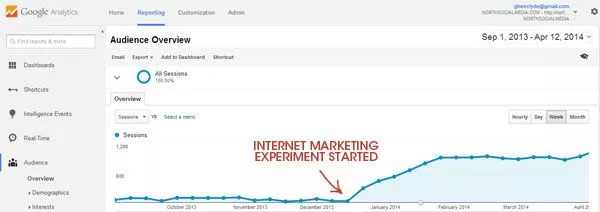
Since the experiment’s end–date is reached, I will exactly tell you the Internet marketing strategies and detailed steps I’ve used to increase blog or website traffic as seen on the graph above in this case study.
Table of Contents
Toggle10 Marketing Strategies on How to Increase Website Traffic
1. Improve Site Load Times for Proper Search Engine Optimization (SEO)
A 2010 study from Akamai Technologies found that 57% of online shoppers would wait 3 seconds or less before abandoning a site. Meanwhile, 65% of 18- to 24-year-olds expect a website to load in 2 seconds or less.
Besides the fact that search engines favor faster websites for rankings and proper SEO and that they increase website traffic and conversions, I have also considered the study conducted above and hence, act on it to improve my website load times through optimization and using a content delivery network (CDN).
A CDN allows your website to serve pages depending on where the user is located.
Neil Patel also explains more steps that still work on how to make your website insanely fast by minimizing your load times to maximize your revenue.
Tools for Testing Website Speed
- Google PageSpeed Insights
Google PageSpeed Insights is a free, open-source web page service that analyzes how your website pages are running and offers guidelines to improve website performance and load time.
- Pingdom Tools
Pingdom Tools helps you analyze the load speed of your website and helps you learn how to make it faster. It offers different features such as examining all parts of a web page, performance overview, performance grade, and tips, tracing your performance history, testing from multiple locations, and sharing your results. You may find my website load time and grade below using this tool.
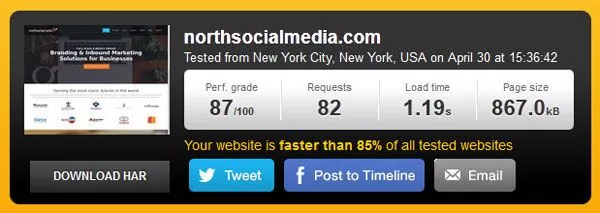
- GTmetrix
GTmetrix uses Google PageSpeed Insights and Yahoo! YSlow to grade your site’s performance and provides actionable recommendations to fix website speed issues. You may also find my website load time and grade below using this tool.
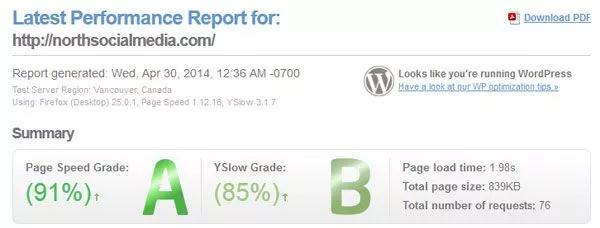
After making my website faster, it added more conversions, consistent visitor flow, and a major increase in website traffic from organic search results. I have also managed to lessen my bounce rate and increase the average duration of sessions from my visitors.
2. Meta Tags Optimization
Meta tags are snippets of code on a web page that provide structured metadata about a web page. Meta tag optimization is an important Internet marketing strategy that I do. In my experiment, I’ve focused on two important meta tags to optimize each web page on my website—page title and meta description.

- Page Title
A page title is considered to be one of the most important on-page ranking factors that show up in the search engine results pages or SERPs. Search engines such as Google, Yahoo!, and Bing use the title tag of your web page as the search results title. Page title optimization should be done with care and thorough keyword research and analysis for better results and to increase website traffic coming from the search engines. The length of a title shouldn’t be longer than 70 characters. The page title should always be unique for each web page you have on your website.
- Meta Description
A meta description tag usually provides a summary of web page content that also shows up in the SERPs. Better meta-description tags, especially those that are well-composed, informative, and compelling, tend to have higher chances of gaining clicks from the SERPs and website visits. The meta description should be at least below 160 characters so that search engines can display it in full. Just like the page title, meta descriptions should also be unique for each web page you have on your website.
Using important meta tags for social and search is not limited to title and description only.
For WordPress users, some plug-ins that I recommend and personally use are WordPress SEO by Yoast and All in One SEO Pack, which allows me to easily create custom page titles and meta descriptions for each web page that I have on my website.
Below is a graph that shows the time when one of my clients accidentally deleted the plug-in I used to activate the optimized meta tag on his website.

You will see that a big drop in traffic could happen if meta tags aren’t visible or created on your website whereas a smart and well-planned meta tag optimization can dramatically increase your website traffic fast.
3. Optimize Website for Mobile Users
One-fifth of Americans access the mobile web each day and according to a 2009 Pew Research Center report, that number is on the rise.
In addition, according to ComScore in 2010, nearly 73 million Americans accessed the web via a mobile browser, with a 31% increase compared to the data from 2009.
There are lots of advantages that you could gain from having a mobile-optimized website—improved user experience, improved SEO performance, competitive advantage, new advertising opportunities, and more.
The best way to get a mobile-optimized website is to choose a responsive theme that you can use when building your website. Elegant Themes and ThemeForest are great marketplaces for finding website themes and templates that you can use.
No matter what device your users are on, website optimization for mobile users is critical for all types of businesses. Tim Ash shares seven tools for creating a conversion-optimized mobile website to help you get started in improving the mobile experience you shouldn’t miss.
4. Eliminate Duplicate Content
Duplicate content is described as content that appears on more than one web page. It can be content that is either the exact duplicate of or closely similar to another content.
Search engines such as Google can penalize displaying your website on search results when multiple pages from your website have the same content, which means you could lose points to a chance of increasing website traffic.
There are different causes and solutions for duplicated content from your website. Kieran Flanagan shared easy steps on how to identify and remedy duplicated issues on your website.
You can use a few of the free tools available that can help you identify duplicate content on your websites such as Virante Duplicate Content Tool, Google Webmaster Tools, and Xenu.
5. Site Crawling and Indexing: Sitemap Creation and Robots.txt
Sitemap Creation
A sitemap is a list of the URLs on your website that informs the search engines that the pages listed are available for crawling. Although it does not guarantee that web pages listed on your sitemap will be included in search indexes, search engines use the data in your sitemap to learn about your site’s structure, which allows them to improve crawling.
There are more resources available on Google Webmaster Tools for help with sitemaps that you can check.
Using the Google XML Sitemaps plug-in for WordPress users easily helps you generate a special XML sitemap that will help search engines like Google, Yahoo!, Bing, and Ask.com to better index your blog or website.
Robots.txt
Robots.txt is a file that can restrict access to your site by search engine robots that crawl the web.
You only need robots.txt if your website includes pages or contents that you don’t want search engines to index. While if you want to index everything on your site, you don’t need it.
You need to make sure that your robots.txt file doesn’t block your important pages from being crawled. You can create a robots.txt file manually or use robots.txt generation tools.
6. Increase Search Traffic through Image Results
Optimized images can drive tons of traffic to your websites from image-based search engines like Yahoo! and Google Image Search.
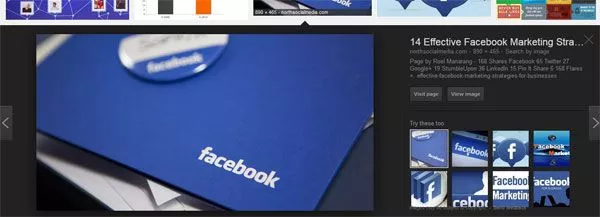
3 Most Important Things to Optimize for Search Image Results
- Alt Tags
The search engine uses the alt text or alt tag to easily recognize and understand the image used on your web page. Adding alt text is simple, you just need to add alt=“your alt text” to your image tag.
- Title/File Name
Image file name or title attributes are important just like the alt tags and page title of a web page because they will help your search engine rankings.
- File Size
As mentioned in #1 in this article, website speed is important for any type of website. Making your image file size as small as possible is better. JPEG image format usually works best since it offers a small file size without sacrificing quality. Online tools like Online Image Optimizer or editing software like Adobe Photoshop could be handy.
Using WordPress plug-ins like WP Smush.it and Lazy Load are also very helpful in optimizing images for your website and making your website fast.
WP Smush.it helps reduce image file sizes and improve performance, whereas Lazy Load helps improve page load times and server bandwidth and it only loads images when visible to the user viewport.
7. Blogging and Content Marketing
Blogging and content marketing are probably some of the best Internet marketing strategies I have used to increase website traffic.
Here are a few statistics on why you must consider blogging according to HubSpot’s State of Inbound Marketing Report (2012) and Science of blogging (2010):
- About 57% of marketers acquired customers from blogging.
- Blog frequency impacts customer acquisition. The 92% of companies who blogged multiple times a day acquired a customer through their blog.
- About 46% of people read blogs more than once a day.
- 81% of marketers rated their blog as useful or better.
Since the website is new, I did not post daily; instead, I write less and promote as much as I can. I also made sure that the contents were updated, helpful to my audience, and high quality as possible.
Meanwhile, content helps you:
- how to get traffic
- keep loyal readers
- make your prospects find your business
- make a personal connection
- close sales
- … and more.
However, you only have seconds to grab someone’s attention before he/she can read your content. So, the best way to grab someone’s attention is by creating persuasive headlines.
I’ve found out that the headlines that work better are the following:
- Starts with “why,” “how to,” or “what”
- Numbered List
- Statistics
- Headlines that raise curiosity, which can also act as link bait
Another thing that you need aside from having persuasive and killer headlines is an enticing website design.
Elizabeth Sillence conducted a study where they asked people to find websites about hypertension. According to the study, 94% cited that design problems were the main reason why they mistrust a website.
The bottom line: Your design can trigger immediate trust and distrust.
In case you are offering professional services or have a company website, this deck, which I discussed in one of my speaking gigs, will surely help you get started.
8. Influencer/Blogger Targeting through Content
One of the best ways to increase your website or blog traffic fast is to target influencers or other bloggers from your industry that produce high-quality resources or at least with a high following.
Influencers are people who have high authority and a huge network in a certain industry.
Once you link to other resources, especially from their blogs, chances are they will share it with their network, which can also give you tons of following and website traffic. Don’t forget to build a relationship with them and inform them once you link to them.
BuzzStream is a great tool for managing influencers painlessly and easily helps you create blogger outreach campaigns. It features contact information research, social influencer discovery, and more.
BuzzSumo also helps us find influencers who can help us promote my content or people who could be interested in the topics I create. I also recommend using this tool on doing competitive analysis and finding topics that work, and that you can write about in your industry.
9. Boost Traffic from Social Media
To increase our traffic using social media, I have done five things:
- building a fan base
- social media management
- website social media optimization
- social media sharing
- and social media paid advertisement.
Building a Fan Base, Social Media Management, and Social Media Paid Advertisement
I have used social media, especially Facebook to target the right audience for my industry, and it has been possible by using Facebook Ads. I have managed to build more than 12,000 fans by allocating 50 USD per month.
Using Google Analytics demographic and interest data, I created a remarketing and targeting campaign for the right audience, and visitors I’ve received to my website.
Facebook Ads’ custom audience feature also helps me target the most valuable customers and prospects on Facebook by uploading a contact list from my MailChimp account.
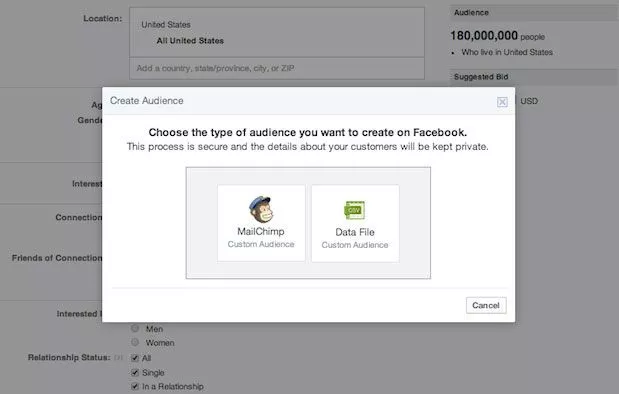
Building a huge fan base on social media networking websites such as Pinterest and Facebook allows you to build loyalty and acquire returning visits from your users.
Once your followers see an update or announcement from your social media profile and click it, especially if it has a link, then you have just gained traffic.
Now imagine publishing updates from your social media sites daily, which could transform into daily website visits.
Website Social Media Optimization and Social Media Sharing
Optimizing your website for better social media sharing can also help your website traffic increase significantly. Integrating social media sharing plug-ins on your blog makes your readers easily share your content.
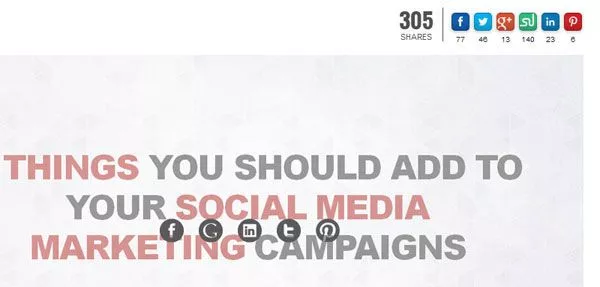
10. E-mail List Building and Marketing
E-mail marketing is using e-mail to distribute your marketing message or to build relationships. It is used in several ways by organizations and marketers for brand loyalty, acquisition, conversions, advertisements, communication, support, and more.
E-mail is still one of the most preferred modes of communication for the majority of consumers. To better convince you, Paul Jorgensen shared 33 mind-shattering marketing statistics that you should know.
However, before you even start doing e-mail marketing campaigns to increase your website traffic, sales, and conversions, you need to first build an e-mail list.
Derek Halpern said, “If you’re not building an email list, you’re an idiot.” And, he’s correct.
One thing that I would add is creating a list-building page.
A list-building page is a page designed to capture e-mail addresses. Here’s an example of a list building page that I have created for North Social Media:
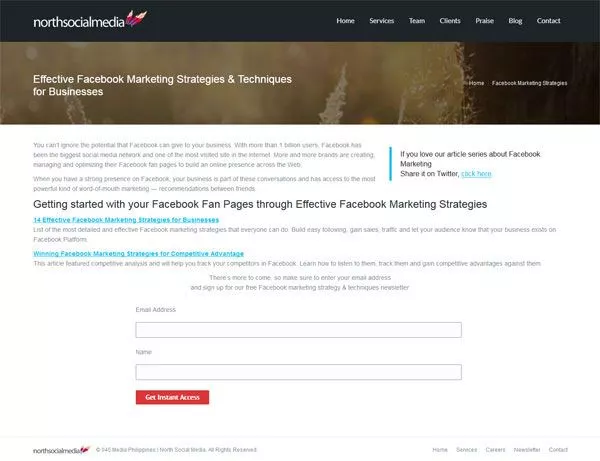
I’ve offered a list of resources on a particular topic I write for my users and added an opt-in form to let them stay updated on future posts, which I will be sending directly to their inboxes.
Looking for an e-mail marketing tool?
MailChimp allows you to send 12,000 e-mails to 2,000 subscribers for free. MailChimp for WP Plugin also lets you easily connect your MailChimp account and put it on your website widget area.
I also recommend Aweber as an affordable alternative option in case you want to set up an autoresponder that converts extremely well.
Conclusion
To summarize, here are some proven Internet marketing strategies that you might want to consider to gain a consistent increase in website traffic:
- Faster website load speed helps your SEO.
- The page title and meta descriptions are important on-page ranking factors.
- A mobile-optimized website offers advantages no matter what type of business you have.
- Eliminating duplicate content from your website can prevent your website from being penalized by search engines such as Google.
- Sitemap creation can help you improve web page crawling and indexing.
- Optimized images can drive tons of traffic to your website from image-based search engines.
- Blogging and content marketing are vital in Internet marketing, as well as having persuasive headlines and enticing designs.
- Reaching out to or targeting bloggers and influencers in your industry can help increase website traffic quickly and build relationships.
- Running different methods of boosting traffic from your social media helps you maintain consistent traffic, gain visitors, and build loyalty.
- E-mail list building and marketing provide huge benefits and advantages.
Your Ideas and Thoughts
Share a tip: Do you have Internet marketing strategies that help you increase your website traffic that is not listed above?
If you have friends or business partners that you know would love this article, feel free to share it and I’ll be forever humbled.
Roel Manarang is a seasoned digital marketer and designer with over a decade of experience helping businesses achieve online success. As the Director of Operations at Workroom, he combines his passions for design and marketing to deliver exceptional results for his clients. With a proven track record of delivering exceptional results for more than 100 businesses, Roel is a sought-after creative strategist specializing in world-class content, websites, SEO, and social media campaigns. Find him on Instagram, LinkedIn, and YouTube.
Subscribe And Receive Free Digital Marketing Tips To Grow Your Business
Join over 8,000+ people who receive free tips on digital marketing. Unsubscribe anytime.


